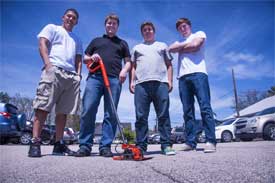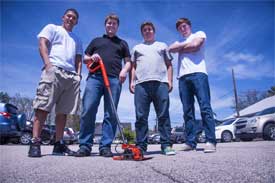 KINGSTON, R.I. – May 8, 2012 – It’s not uncommon for local public works crews to repair a pothole in early spring only to have to redo the job again and again as the asphalt patch wears away. Now a team of five engineering students at the University of Rhode Island has developed a device that will compact the asphalt patch more effectively so the patch lasts three times longer than traditional methods.
KINGSTON, R.I. – May 8, 2012 – It’s not uncommon for local public works crews to repair a pothole in early spring only to have to redo the job again and again as the asphalt patch wears away. Now a team of five engineering students at the University of Rhode Island has developed a device that will compact the asphalt patch more effectively so the patch lasts three times longer than traditional methods.
The device, a vibrating compactor the size of a home vacuum cleaner, was created as the students’ senior capstone design project.
“A number of companies came in to class at the beginning of the year and presented projects for us to work on,” said Michael Maher, a mechanical engineering major from Wakefield who served as team leader for the project. “I had been taking a vibrations course that really interested me, so I picked the pothole project.”
Vibco Vibrators, a Richmond-based manufacturer of industrial vibrating equipment, asked the students to design a hand-held device that could be used by Department of Transportation and municipal road workers, as well as homeowners seeking to effectively compact small areas. The company provided the students with a vibrating motor and the metal plate that it sits on, but it was up to the students to design the rest.
“Our partnership with URI provides added value to engineering education and practice for both the students and our company,” said Vibco Vibrators President Karl Wadensten. “A spirit of mutual learning is important for young engineers to develop. They understand that their project has an impact on both the company and the general public. This prototype could save untold taxpayer dollars and improve the quality of our roads. We should all be proud of these young people.”
“Our main focus was to isolate the part that vibrates from the handle and battery system,” explained Maher, who worked on the project with fellow engineering students Glenn Bautista of Providence, Shawn Fineout of Cumberland, Josh Lopes of Barrington and Tim Pheland of North Scituate.
Each of the students brainstormed 30 ideas for how to design the device, and then they picked five ideas to develop further. By the end of the fall semester, they had a prototype to test and refine.
“We based our design off the look of a vacuum cleaner, because you operate it with a similar arm motion,” said Maher. “Our first version was uncomfortable to operate because it shakes your arm a lot, so we looked into different types of rubber isolation mounts.”
The students talked to a company in Switzerland, but found their equipment was too expensive. They eventually found a way to keep the handle in one place while the motor and plate vibrated.
“You’re never going to get rid of all the vibration, but it’s much better than it was,” Maher said.
The students, all of whom will graduate from URI on May 20, have been invited by Vibco officials to make a presentation about their device to Wadensten in the coming weeks.
“They’ll take our ideas, make whatever changes they think are necessary, and they’ll put a price tag on it and try to sell it,” Maher said, noting that at an exhibition of student engineering projects last week, several people said they’d like to buy the device. “We got some interest at our showcase from people who said they wanted to use it to fix some holes in their driveway. So it definitely has good potential.”
Pictured above
URI engineering students Glenn Bautista, Shawn Fineout, Mike Maher and Tim Pheland display the asphalt compactor they designed for their senior project. Missing from photo is Josh Lopes.
URI Department of Communications & Marketing photo by Michael Salerno Photography.

